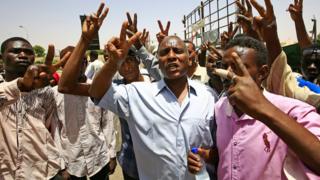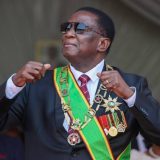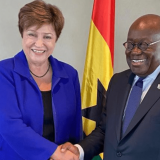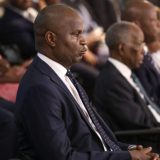At least four Sudanese protesters and a member of the security forces have died in clashes in the capital, Khartoum.
They were killed in gunfire at a sit-in outside military HQ where demonstrators are demanding full civilian government.
Protesters said soldiers were responsible, but the army blamed it on “unidentified elements”.
Sudan has been governed by a transitional military council since the overthrow of President Omar al-Bashir last month.
Demonstrators have been occupying the square in front of the headquarters since 6 April, five days before the president was toppled by the military.
Initially, talks between the ruling generals and the protest organisers had shown little sign of progress.
However, just before Monday night’s violence, both sides announced they had agreed on the structure of a new administration.
The gunfire on the streets may point to a division within the military and an attempt to destabilise this process, says the BBC’s Alastair Leithead.
Some generals may feel frustrated that the sit-in continues despite major concessions from the military, while demonstrators feel they cannot leave the streets until they get what they want, our reporter adds.
How did we get here?
In December, protesters started demonstrating against a government decision to triple the price of bread. The protests soon morphed into widespread anger against the president’s 30-year rule, led by doctors.
Five weeks into the protests, on 17 January, witnesses said state forces fired live ammunition at protesters and killed a doctor.
He had been treating injured protesters in his home in Khartoum when police fired tear gas into the building.
A witness told the BBC that the doctor had walked out with his hands in the air, told the police he was a doctor and was instantly shot.
He is one of dozens of people killed during the anti-government protests.
The protesters later staged a sit-in outside the military headquarters to demand the military force the president out.
A military council assumed power of the country on 11 April, but demonstrators are insisting that it hands over to a civilian administration.
Military-opposition deal?
An opposition coalition and the ruling military council announced on Monday that they had reached a breakthrough agreement on a power structure to see the country through the transition.
“At today’s meeting we agreed on the structure of the authorities and their powers,” protest movement spokesman Taha Osman told the AFP news agency.
“The authorities are as follows – the sovereign council, the cabinet and the legislative body,” he said.
The military council also confirmed that a deal on a transitional power structure had been reached.
Source: bbc.com





